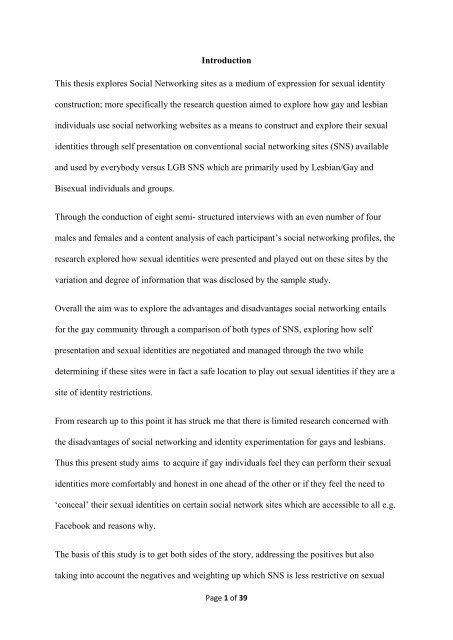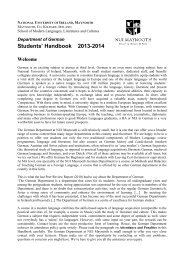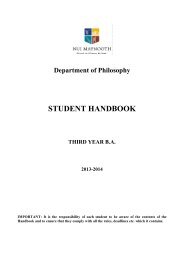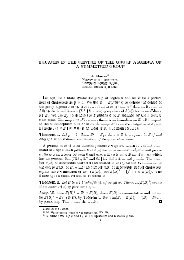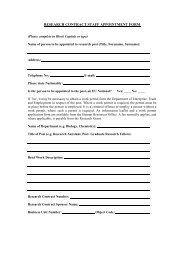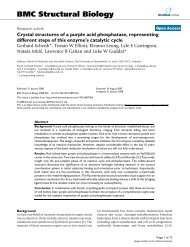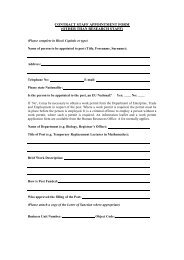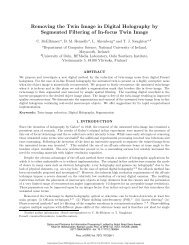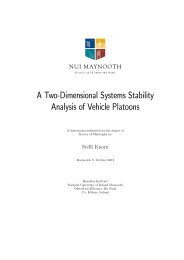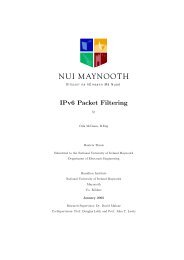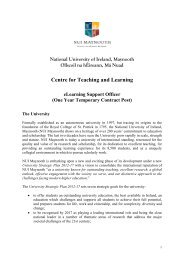Introduction This thesis explores Social Networking sites as a ...
Introduction This thesis explores Social Networking sites as a ...
Introduction This thesis explores Social Networking sites as a ...
You also want an ePaper? Increase the reach of your titles
YUMPU automatically turns print PDFs into web optimized ePapers that Google loves.
<strong>Introduction</strong><strong>This</strong> <strong>thesis</strong> <strong>explores</strong> <strong>Social</strong> <strong>Networking</strong> <strong>sites</strong> <strong>as</strong> a medium of expression for sexual identityconstruction; more specifically the research question aimed to explore how gay and lesbianindividuals use social networking web<strong>sites</strong> <strong>as</strong> a means to construct and explore their sexualidentities through self presentation on conventional social networking <strong>sites</strong> (SNS) availableand used by everybody versus LGB SNS which are primarily used by Lesbian/Gay andBisexual individuals and groups.Through the conduction of eight semi- structured interviews with an even number of fourmales and females and a content analysis of each participant’s social networking profiles, theresearch explored how sexual identities were presented and played out on these <strong>sites</strong> by thevariation and degree of information that w<strong>as</strong> disclosed by the sample study.Overall the aim w<strong>as</strong> to explore the advantages and disadvantages social networking entailsfor the gay community through a comparison of both types of SNS, exploring how selfpresentation and sexual identities are negotiated and managed through the two whiledetermining if these <strong>sites</strong> were in fact a safe location to play out sexual identities if they are <strong>as</strong>ite of identity restrictions.From research up to this point it h<strong>as</strong> struck me that there is limited research concerned withthe disadvantages of social networking and identity experimentation for gays and lesbians.Thus this present study aims to acquire if gay individuals feel they can perform their sexualidentities more comfortably and honest in one ahead of the other or if they feel the need to‘conceal’ their sexual identities on certain social network <strong>sites</strong> which are accessible to all e.g.Facebook and re<strong>as</strong>ons why.The b<strong>as</strong>is of this study is to get both sides of the story, addressing the positives but alsotaking into account the negatives and weighting up which SNS is less restrictive on sexualPage 1 of 39
identity construction. Self presentation will be a dominant theme in drawing research,extending on the existing research exploring the differences of presentation between the two<strong>sites</strong>.Page 2 of 39
Chapter 1LiteratureIdentity construction and self presentation are two concepts that continue to f<strong>as</strong>cinatecontemporary sociologists and students of the discipline alike. Goffman writing in the 1950swrote intensively on the concept of identity and impression management with theories thatstood the test of time and are <strong>as</strong> relevant <strong>as</strong> ever today. Once cyberspace and internetrelations are thrown into the mix, things get even more interesting. As society progresses, sotoo does technology and <strong>as</strong> a result we <strong>as</strong> ‘social actors’ are provided with an ever expandingarena to explore and play out our identities.To explore how LGB indentified individuals navigate through social network <strong>sites</strong> andconstruct sexual identity, we must look at a number of different components, in particularhow they navigate through real life and manage their sexuality offline, which we can thenapply to the online navigation of <strong>Social</strong> Network <strong>sites</strong>. The purpose of social networkingmust be considered and how they serve <strong>as</strong> a stage for identity construction through forms ofself presentation, along with what they offer LGB identities.Cyberspace h<strong>as</strong> opened up a brand new chapter in self presentation. Through online textualdescriptions we choose how we present ourselves and ultimately choosing which <strong>as</strong>pects ofour identity we wish to share or conceal, such <strong>as</strong> our gender or race. It provides a space whereone can “try on” new identities, explore characteristics that intrigue us, and become membersof groups we never would in the ‘real world’.Regarding sexuality exploration, social networking <strong>sites</strong> have received praise <strong>as</strong> anenvironment for positive LGB identity construction. Most contemporary research andempirical data all points to the advantages that social networking entails for lesbian and gayPage 3 of 39
‘P<strong>as</strong>sing’ means “the successful accomplishment in social interaction of a usual,unremarkable social identity by an individual, who would if discovered, be deemed unusualor different in some crucial way” (Ponse, 1976:238). For LGB people this entails p<strong>as</strong>sing <strong>as</strong> <strong>as</strong>traight identity among straight persons using strategies such <strong>as</strong> impression management.Goffman (1963:2) distinguishes between virtual social identity which is the self thataudiences expect to see and actual social identity which is the real self. In this analysis virtualidentity refers to the straight m<strong>as</strong>k presented to some audiences by the gay actor while actualidentity refers to the gay self (Ponse, 1976).Offline this may not be a challenge <strong>as</strong> sexuality does not take physical form, but if in p<strong>as</strong>singone must be aware always of the audience and maintenance of activity. The need for p<strong>as</strong>singmay be perceived <strong>as</strong> more or less urgent with respect to particular audiences of friends oracquaintances, for example, the working environment is a setting where sexuality can berestrained (Ponse, 1976). Thus in exploring social networking <strong>sites</strong> this element of p<strong>as</strong>singwhich is very e<strong>as</strong>ily adapted online, can come under threat depending on what type of socialnetwork site is used and who h<strong>as</strong> access to the profile page.Online IdentityOnce upon a time our only chance to for a first impression or social interaction w<strong>as</strong> b<strong>as</strong>edupon face to face impressions. Since the introduction of the Internet however, web<strong>sites</strong> likechat rooms, dating <strong>sites</strong> and the focus of this study, social networking <strong>sites</strong> such <strong>as</strong> Facebookand MySpace have all provided a new and exciting opportunity (Livingstone, 2008) for oneto determine how to present themselves to others.We manage our impression and <strong>as</strong>pects of our identity in multiple ways and this <strong>as</strong>pect ofchoosing and controlling our impression is the fundamental feature of social networking <strong>sites</strong>.<strong>Social</strong> networking <strong>sites</strong> allow us to choose and perform different <strong>as</strong>pects of our identity or inPage 6 of 39
the c<strong>as</strong>e of LGB people, can allow for e<strong>as</strong>y p<strong>as</strong>sing. Goffman’s theatrical metaphor providesan insight to understanding how individuals in certain circumstances “consciously andunconsciously” perform their sexual identity to others (Valentine, 1992:241) which can beapplied in this present study to relate to SNS.<strong>Social</strong> networking <strong>sites</strong> such <strong>as</strong> Facebook and My Space have attracted millions of users overrecent years and popularity of their usage continues to grow. Livingstone (2008) points outthey promote a “narcissistic f<strong>as</strong>cination with self-display” (p.393) and “for many, creatingand networking online is becoming an integral means of managing ones identity, lifestyle andsocial relations” (p.394). Some <strong>sites</strong> cater to diverse audiences, while others attractindividuals b<strong>as</strong>ed on shared experiences or shared identities such <strong>as</strong> race, religion andsexuality (Boyd and Ellison, 2008).O'Connor and MacKeogh (2007) explore the possibility of developing and sustaining a senseof community in a virtual world minus regular face to face interaction concluding that femalemembers of an online discussion board felt empowered and used the site <strong>as</strong> a space forbonding, which is similar to the concept of SNS, where people with shared identity such <strong>as</strong>sexuality may feel a greater sense of togetherness.A <strong>Social</strong> network site can be defined <strong>as</strong> “web b<strong>as</strong>ed services that allow individuals to (1)construct a public or semi-public profile within a bounded system (2) articulate a list of otherusers with whom they share a connection, and (3) view and transverse their list ofconnections and those made within the system” (Boyd and Ellison, 2008:211).Goffman formulates a distinction of where our performances take place- front stage (wherethe performance takes place and an audience is present) and back stage (where one canpractice the performance without the eyes of the audience) and Guerrero, Anderson and AffifiPage 7 of 39
(2007) point how Facebook pictures and profile content are usually selected privately withoutan audience but are presented and viewed front stage.<strong>This</strong> too can be applied to sexuality online. Our online composition can vary with regards tothe type of social networking site we use and regards to the people we interact with.Valentine (1992), like Ponse (1976) found that at different times and different places such <strong>as</strong>work, lesbians and gay men are forced to decide “if, how and when to disclose theirsexuality” (p.237). Online then, we may decide to conceal our sexuality (like ‘p<strong>as</strong>sing’ in reallife) on a mainstream website but expose our sexual identity on a site fundamentally devotedto sexual minority groups.It is this <strong>as</strong>pect of identity multiplicity and flexibility that Turkle (1999) focuses on. Onlinewe can create fake identities through textual description. From theses descriptions we are leftto our own devices to draw our own conclusions b<strong>as</strong>ed on what we are presented with, forexample if their ‘interested in’ field is left blank, we may question their sexual preference(Baker and Moore, 2007).Because the text is written, and we control what is disclosed, we have time to reflect and editour composition, perhaps providing a better ability to manage our identity which may not bepossible offline. Turkle, similar to Goffman and Valentine provides a more modern insight inparticular one of identity in cyberspace.<strong>This</strong> multiplicity element of social networking allows for identity play and is considered <strong>as</strong>one of the many advantages of social networking <strong>as</strong> it helps expose how sexual identities areconstructed thus will be explored and compared with current findings of this study.Page 8 of 39
Anonymity and belongingCopper et al. (2000) discusses online sexuality <strong>as</strong> whole exploring a wide range of topicssuch <strong>as</strong> internet relationships, sexual information and in regard to relevance of this presentstudy, alternative communities and disenfranchised people. Looking at the advantages, theauthors explain how the internet h<strong>as</strong> allowed gay minorities become majorities in their ownvirtual communities and made it accessible for them to communicate, network andexperiment away from prejudice and discrimination.<strong>This</strong> of course if one of the major benefits of the internet on sexual identity building, peoplewho have a hard time meeting others have a better chance of meeting compatible peopleonline, but it disregards public virtual communities such <strong>as</strong> social networking <strong>sites</strong> andfocuses primarily on confidential gay dating services.Donald et al. (1998) address the advantages of electronic networking in the lesbian and gaycommunity, with the greatest advantage again being the fact that gays and lesbians from ruralare<strong>as</strong> can interact with online with anonymity. <strong>This</strong> notion of online anonymity allows usersto m<strong>as</strong>k <strong>as</strong>pects of their identity (O'Connor, B. & C. MacKeogh, 2007) including sexuality.McKenna and Bargh (1998) concerned with stigmatized identities and online newsgroups,found that in participating in an internet group sharing a marginalized <strong>as</strong>pect of one’s identityled to a transformation of an individual’s social identity offline, which in turn incre<strong>as</strong>ed selfacceptance. As users found the marginalized newsgroups an incre<strong>as</strong>ing importance to theiridentity they began to “feel this <strong>as</strong>pect of themselves is more socially acceptable than theyhad thought” (p.692).<strong>This</strong> might be the c<strong>as</strong>e in this current research, when exploring LGB SNS, however it is quitedated (1998), the mean age of the sample is 37years and there is a big difference inPage 9 of 39
newsgroups and SNS. Again this study focuses on online environments for particularstigmatized identity groups, not inclusive of all.Although these findings are important to consider and will be explored and compared againstfindings of this present study, they are <strong>sites</strong> for a particular audience, thus my interest is inexploring how self presentation and identity construction compares to mainstream and moremainstream <strong>sites</strong>?Gr<strong>as</strong>muck at al. (2009) <strong>explores</strong> differences in self presentation by ethno racial groups,examining identity construction on Facebook “a nonymous online environment that is lesslimiting than internet dating <strong>sites</strong>” (p.161) <strong>as</strong> the authors found much of the p<strong>as</strong>t research onracial identity production, and <strong>as</strong> I found to be the equivalent with sexuality, “h<strong>as</strong> treated theonline environment mostly <strong>as</strong> a disembodied and anonymous environment” (ibid).The findings of this research concluded that ethno racial groups, previously marginalized inearlier days of the internet are well articulated, elaborated and “putting themselves out there”on Facebook. In my own research I hope to achieve a similar outcome and determine if thistoo is the c<strong>as</strong>e for sexuality, if it downplayed or <strong>as</strong>serted on a more nonymous site versus ananonymous LGB site.Gr<strong>as</strong>muck et al. (2009) discuss how Facebook is an ideal condition for exploring identity <strong>as</strong> itallows users to specify many dimensions of their identity, including sexuality (“interested in”is an included profile feature). What differentiates Facebook from other online communitiesis that members primarily communicate with people who are already part of their extendednetwork (Boyd and Ellison, 2008), “local contacts with stronger ties centred on pre-existingstudy or work contexts” (Livingstone, 2008: 395) and are usually looking for romance andfriendship among people they already know (Gr<strong>as</strong>muck et al. 2009).Page 10 of 39
An interesting question posed by Gr<strong>as</strong>muck at al. which relates directly to this current studyw<strong>as</strong> that given the fact Facebook is nonymous, and users can potentially have their claimschallenged offline, how realistic are Facebook claims. E.g. how realistic is the informationdisclosed. Therefore my interest raises the question, is one more inclined to reveal or concealtheir sexuality from people they know if online experiences can have offline consequences?As with offline challenges of ‘p<strong>as</strong>sing’, who do we select to reveal our sexuality to?On LGB SNS, where all the members have a shared characteristic, being their homosexuality,there is a lesser fear of homophobic behaviour or judgemental attitudes which are attachedsadly, to members of minority groups in society. Therefore for this study I found it importantto consider conflicting identities and in trying to gr<strong>as</strong>p why different information is disclosedon different <strong>sites</strong>.Although many LGB people may be content with having two separate spaces for identityexploration, and which may very well be the c<strong>as</strong>e when interviewing my sample, I can’t helpbut feel there is a re<strong>as</strong>on behind why LGB identified people navigate through socialnetworking <strong>sites</strong> differently, depending on the audience, <strong>as</strong> with offline in p<strong>as</strong>sing.Reinforcement of homophobic behaviour?Livingstone (2008) indicates creating identity and social relations online is not only timeintensive and on occ<strong>as</strong>ion risky, but can be difficult to manage. Online risks may arise fromindividuals willing, sometimes naive self display of personal information to a wide circle ofcontacts. As well <strong>as</strong> from the possibility of being neglected or excluded: “Deciding what notto say about oneself online is for many an agentic act to protect their identity and their spacesof intimacy” (P.409).Page 11 of 39
Given the extent of homophobic behaviour offline, it is no wonder why many LGB peoplewould consider creating identity online <strong>as</strong> risky, and with the options of multiple identities atthe click of mouse, indeed difficult to manage. Although the scale of this study is not toexamine bullying or even the extent of homophobic behaviour witnessed by my sample it isimportant to recognise the severity of this behaviour on an individual and to understand whyone would want to adopt other or hide <strong>as</strong>pects of identities. More recently, there is a worrythat this is creeping into <strong>Social</strong> <strong>Networking</strong> <strong>sites</strong>.Swaine (2011) for the Irish Independent reports of a teenager found dead, having committedsuicide after torment and online bullying because of his sexuality. Anonymous abusivemessages were left under Jamey Rodemyer’s posts on social networking site Formspringwhich is a mainstream site. The youth wrote of his unhappiness and spoke of suicide on hisblog.What’s interesting to note is that Jamey w<strong>as</strong> openly gay and his parents provided fullsupport. What struck me w<strong>as</strong> the torment he received from strangers online w<strong>as</strong> enough todrive him to suicide thus prompting how seriously we take our online audience. Thus I <strong>as</strong>k,because of certain online behaviour and comments from others on mainstream SNS, dotraditionally marginalised groups in particular homosexuals feel they must conceal certain<strong>as</strong>pects of identity <strong>as</strong> they would in offline environment to maintain a peaceful and safeliving?As mentioned, the majority of current research on sexual identities and social networkingtend to favour the advantages of multiple identity play, anonymity and e<strong>as</strong>y p<strong>as</strong>sing, whichevidently cannot be dismissed. Offline, managing <strong>as</strong>pects of identity have proven to bedifficult for many so given the option for an environment where identity in particular, sexualidentity can be controlled.Page 12 of 39
However I have found there to be a lack of research that <strong>explores</strong> the disadvantages of socialnetworking for lesbian and gay identities and all research tends to deal exclusively with LGBsocial networking <strong>sites</strong>. Gr<strong>as</strong>muck et al. (2009) exploring ethno racial groups found thatidentity altered between mainstream SNS and SNS that strictly required membership of aracial group.It is my belief therefore, that this is similar to sexuality online. B<strong>as</strong>ed on lack of research, itis my theory that mainstream social network <strong>sites</strong> might actually recreate homophobia online,resulting in many LGB individuals expressing closeted behaviour and expressions and in turnreinforcing homophobia in real life.Goffman discusses the importance of our audience and how we constantly seek approval ofothers. Our SNS profiles reflect this, everything we write about ourselves is for others to seeand for this research I attempt to determine if, how and why LBG people choose to conceal ordisclose their sexuality on mainstream SNS versus LGB SNS.To my knowledge, no sociological comparisons between the two for identity constructionhave been made. <strong>This</strong> current research is an attempt to build on the foundations laid down byGoffman in the 1950s, exploring and managing identity, but like Turkle and Gr<strong>as</strong>muck, in amore modern society, applying it to sexual identity and to an online setting.To do so, a series of semi structured face to face interviews supported by content analysis ofeach interviewee social networking pages, will be carried out with self identified gay andlesbian individuals.Conclusions will be limited due to the small sample number and the results will not begeneralizable to the larger gay population.Page 13 of 39
Chapter 2: Methodology1. Selecting the Research MethodAs the purpose of this study w<strong>as</strong> of an explanatory and exploratory nature I felt the mostappropriate method of research for this particular topic w<strong>as</strong> qualitative. My main objectivew<strong>as</strong> to gather data from LGB identified individuals on social networking <strong>sites</strong>, in particularinformation about identity and impression management between mainstream socialnetworking <strong>sites</strong> and LGB (Lesbian, Gay, Bi) social network <strong>sites</strong> (SNS).The required data and sample w<strong>as</strong> very specific, in short I needed to collect data thatprovided an insight to how LGB people navigate through SNS, information disclosed onpersonal profiles and re<strong>as</strong>ons <strong>as</strong> to why certain information w<strong>as</strong> or w<strong>as</strong> not included on thepage, and of course this required LGB individuals with regular access and knowledge ofcomputers and the internet.Specifically, data w<strong>as</strong> collected through the conduction of eight semi-structured, intensive,face to face interviews with open ended questions, collected through a recording device on alaptop. <strong>This</strong> data w<strong>as</strong> then supported with a brief content analysis of the each of theparticipant’s social networking profiles in which I examined the degree of informationdisclosed and made a comparison between the two <strong>sites</strong> when available.According to Schutt (2009) qualitative methods “emph<strong>as</strong>ize observations about naturalbehaviour...capture social life <strong>as</strong> it is experiences by the participants rather than in categoriespredetermined by the researcher” (p.315) and furthermore, defines intensive interviewing <strong>as</strong>“a method that involves open-ended, relatively unstructured questioning in which theinterviewer seeks in-depth information on the interviewers feeling, experience andperceptions” (ibid).Page 14 of 39
Thus, requiring in depth information on impression management and experiences of thenatural behaviour of using social networking <strong>sites</strong>, interviewing proved to provide a more indepth analysis and gave room for the sample to share opinions and voice their outlook on theresearch questions, <strong>as</strong> opposed to quantitative methods. The option to choose interviewing <strong>as</strong>the research method proved to be the most efficient form of data collection.Quantitative methods, for this project, were never an option <strong>as</strong> I found them to be much tooconstraining for this research. Although surveys are versatile and efficient, allowing for datacollection from a large group of people in a short time period, it w<strong>as</strong> not suitable for thisresearch which required explanations and exploratory questions, surveys predominantly usepredetermined answers in data collection. Perhaps my questions could have been adapted tosuit a survey layout; however the findings would have been limited to yes or no style answerswith little room for explanations and <strong>as</strong> the questions are set, no room for sub questionsstemming from something that may have been said.Regarding qualitative methods, participant observation w<strong>as</strong> not adequate. Schutt (2009)indicates that participant observation is a method for gathering data that “involves developinga sustained relationship with people while they go about their normal activities” (p.315). Itw<strong>as</strong> not enough to simply observe my sample navigating through social networking <strong>sites</strong>,undisturbed and draw up findings from this.Although it would have allowed the chance to see firsthand how my sample navigatesthrough social networking <strong>sites</strong>, I considered it intrusive of privacy. <strong>This</strong> method I suspected,before beginning research, would also prove time restrictive. Instead I opted for a contentanalysis of each Facebook page before each interview.Initially I had considered conducting a focus group, <strong>as</strong> it would have been time efficient andallowed for much discussion. I also considered that my sample of LGB people would feelPage 15 of 39
more comfortable and <strong>as</strong> a result more honest when in a group of shared similarities, howeverdrawing a sample of 8-10 people and attempting to round them all up together on the sameday and time proved much difficult <strong>as</strong> I had problems in general with drawing a sample.Finally I stuck to interviewing. I found it to be the most appropriate method and successful. Itw<strong>as</strong> accessible and simple to conduct once a sample w<strong>as</strong> obtained and <strong>as</strong> I had access to gayindividuals in my own social networks it provided a good starting point.The benefits of this method overshadowed the disadvantages immensely. Firstly I found it tohave a less formal feel, and more or less like a conversation with my sample which hadimpact on the reliability, <strong>as</strong> no volunteer refused to show their SNS pages. Timing w<strong>as</strong> notmuch of an issue, <strong>as</strong> after finding suitable respondents, a time, day and place w<strong>as</strong> negotiatedto suit both parties.Face to face interviews gave way to a change of direction in interviewing and felt much morepersonal. I feel that results and validity would have altered greatly through telephone or emailinterviews, <strong>as</strong> I got to know every interviewee before conducting an interview interacting byengaging in some general ‘chit chat’ before getting straight into the interview which is why Isuspect no participant had problems showing their pages.There were a number of limitations that could have potentially affected validity andreliability. Current findings seem substantial but I cannot speak on behalf of my respondentsor determine how honest the provided data is. Because of the small sample and type ofsampling (see section 2) the findings cannot are not generalizable to the larger gaypopulation.Limitations were not exclusive to the method, but to the overall study design. Firstly I neededa sample from a gay population (see section 2) and respondents with regular access andPage 16 of 39
knowledge of computers and the internet. I also needed access to the internet and a computerfor every interview carried out. Entering the field <strong>as</strong> a straight female, interviewing LGBindividuals, there w<strong>as</strong> a chance this could spoil the field and affect the validity of results.2. Deciding on Sample usedBecause my research question explored a particular group in society my sample needed bevery specific. I needed to speak to members of the LGB community, who regularly used aconventional social network site and a LGB SNS and of course, that were voluntary willingto share information and allow analysis of their profiles.My sample selection did not go accordingly to plan, but in all turned out successful. As <strong>as</strong>tarting point I decided on purposive sampling where “each sample element is selected for apurpose, usually because of the unique position of the sample elements” (Schutt, 2009:173)in this c<strong>as</strong>e, sexuality. Initially I had intended on using this sample method throughout myresearch, drawing my LGB sample from two locations providing a broad variation of sexesand ages.The first intended location to draw a sample from w<strong>as</strong> the Outhouse centre in Dublin (whichaccording to the website is a community and resource centre for LGBT people, their familiesand friends b<strong>as</strong>ed in central Dublin. Its primary goal is to offer a safe space for people toinform, meet organize and make things happen) after a recommendation from my supervisor.However after contacting via email requesting volunteers and outlining my objectives, Ireceived a reply with encouragement to post advertisements on web<strong>sites</strong> and in the centre(See Appendix 1). Giving the time frame, advertising w<strong>as</strong> not an ideal option. Also with thelocation of the centre being Dublin, it would have proven time consuming and costly.Page 17 of 39
The second location w<strong>as</strong> here in NUIM- the LGBTQ (Lesbian, Gay, Bi, Trans andQuestioning) Society. Initially I had thought it would be ideal and accessible, but having beeninvolved with some of the activities of the society from the previous year, and having directcontact to the groups Facebook page, I w<strong>as</strong> aware that many other students completingdissertation projects which concerned identity and sexuality, were too turning to thispopulation to draw a sample.Thus it w<strong>as</strong> my concern entering this field, that if members were involved in other researchprojects, they would feel less inclined to engage in further projects, or would participate halfheartedlywhich in turn would have an effect on the validity and reliability of the data. Notwanting to make anybody feel like they were a source of study or different, I feared with theconstant stream of requests for participants from the LGBTQ Society that they would feellike they were being “constantly studied”.Instead my option w<strong>as</strong> to begin with purposive sampling but move onto snowball sampling,which Schutt (2009) states is “a method of sampling in which sample elements are selected <strong>as</strong>they are identified by successive informants or interviewees” (p.174). To begin I turned tothree self identified gay friends who in turn referred me on to partners and gay friends whowere willing to participate. In one c<strong>as</strong>e a male presented himself after hearing about theresearch and offered to take part along with a friend.<strong>This</strong> sampling method proved successful and reliable and once a volunteer w<strong>as</strong> recruited,arrangements for the interview were made to accommodate both parties (Interviewer andInterviewee). I w<strong>as</strong> lucky that all participants were e<strong>as</strong>y accessible, within my social network,being either in my home community or in NUIM, which w<strong>as</strong> suitable for the time period andon costs. Being friends with some of the sample, there w<strong>as</strong> a fear that the validity of resultswould be tainted or bi<strong>as</strong>ed <strong>as</strong> they may have held back on some information to avoidPage 18 of 39
embarr<strong>as</strong>sment or even over exaggerated answers in order to accommodate the researchquestions.3. Ethical ConsiderationsBecause the research required finding out a significant deal of personal information andaccess to personal profiles, a number of ethical issues were considered. Firstly everyinterviewee w<strong>as</strong> made fully aware of the research and required data.It w<strong>as</strong> expressed that there would be no physical or psychological harm in participating and itwould be non-exploitative. I explained that the interviews were completely confidential andno one would have access to the transcript other than myself and my supervisor. Everyparticipant w<strong>as</strong> made fully aware that everything said in the interview must be recorded; noone w<strong>as</strong> deceived in way.Voluntary participation w<strong>as</strong> expressed and everyone w<strong>as</strong> well aware that there w<strong>as</strong> noobligation to take part before granting full consent. Once gained, privacy w<strong>as</strong> a majorconcern. All identities were sealed and a pseudonym w<strong>as</strong> used throughout, granting completeanonymity.All interviews were carried out and saved on a personal p<strong>as</strong>sword protected laptop, and allfile names were coded in c<strong>as</strong>e of theft. Further protecting privacy and safety; all interviewswere carried out in safe spaces (See section 3) with just the interviewer and intervieweepresent, and questions were <strong>as</strong>ked only once approval w<strong>as</strong> granted from my supervisor.Page 19 of 39
4. Carrying out the ResearchAfter weighting up the research options available, deciding, choosing a sample method andconsidering a professional code of ethics, it w<strong>as</strong> now time to undertake the actual research.The first step w<strong>as</strong> to compile the interview guide which consisted of 3 sections: mainstreamSNS, LGB SNS and comparisons (See Appendix 2) which were then ethically approved bymy supervisor.My first participant w<strong>as</strong> b<strong>as</strong>ed in my home community. I chose him <strong>as</strong> he w<strong>as</strong> accessible,openly gay and <strong>as</strong> a friend, felt he would not refuse me. Interviewing a friend first w<strong>as</strong> not byaccident. I chose him almost <strong>as</strong> a practice run, to test reliability of the method and to adjustfurther questions if need be. As I did not know some of the other participants I knew Icouldn’t request second or third meetings, so by interviewing a friend first who did not mindgiving up his time, ensured I got the interviews just right before interviewing others.Once explaining my research he happily agreed to take part. A day and time w<strong>as</strong> adjusted tosuit both and the interview took place in his car, which his chose <strong>as</strong> he did not feelcomfortable discussing the topic in a house with his family or mine or in a location where hewould be heard by others. Because I w<strong>as</strong> using my laptop <strong>as</strong> a recording devise this w<strong>as</strong> noproblem <strong>as</strong> it w<strong>as</strong> e<strong>as</strong>ily portable.The majority of interviews of people in my home community, known to me and referred <strong>as</strong>partners by the participants took place in their homes, by their choice <strong>as</strong> this is where they feltmost comfortable and safe. <strong>This</strong> w<strong>as</strong> no problem for me <strong>as</strong> my hometown is very small! Forthose b<strong>as</strong>ed around the university a room w<strong>as</strong> booked for each interview above the SU,available to students to hold meetings and interviews etc. The room w<strong>as</strong> booked for an hourand a half each time, to allow time before and after the interview to talk.Page 20 of 39
Before each interview every participant showed me their SNS pages, every participant usedand showed me their Facebook profiles and not all the respondents used LGB site. From thisI <strong>as</strong>k questions on things such <strong>as</strong> relationship status, groups and pages they liked and again onthe LGB <strong>sites</strong>, information they disclosed about themselves.Rather than <strong>as</strong>king standard questions in a fixed order, I began with questions from myinterview guide, and then allowed for open ended questions which varied across eachinterview b<strong>as</strong>ed on what w<strong>as</strong> found on profile pages, and allowing my respondents to answerquestions in their own words (Schutt, 2009). All interviews were recorded through a voicerecording app on my laptop and saved under file names which did not contain any realnames.To organize the data I created individual files on my laptop for each participant, whichincluded the transcripts and recording of the interview. On deciding what to include a copy ofeach transcript w<strong>as</strong> printed off and coded, pairing similarities across all participants.Deciding what to include in the findings w<strong>as</strong> difficult, however to narrow it down I createdprofiles for each participant, which contained the <strong>sites</strong> they used, information disclosed andother relevant information (see Appendix 3) so the reader can refer to this information <strong>as</strong> well<strong>as</strong> the main findings. Remarks and comments that I found be adequate were included and thepoints which were repeated across all interviews were noted.Page 21 of 39
Chapter 3Analysis of Results and conclusionThe aim of this research w<strong>as</strong> to examine how gay, lesbian and bi-sexual identified peoplenavigate through both mainstream and LGB social networking <strong>sites</strong>; with the researchquestion <strong>as</strong>king how do mainstream <strong>Social</strong> <strong>Networking</strong> Sites provide an environment forSexual Identity Construction compared to LGB <strong>Social</strong> network web<strong>sites</strong>?Overall the objective w<strong>as</strong> to try and determine if social network <strong>sites</strong> provide an ideal arenato explore sexual identities, <strong>as</strong> research (Copper et al., 2000; Donald et al., 1998; O Connorand Mac Keogh, 2007; McKenna and Bargh, 1998) previously indicated, or if they were infact a place that further led to identity restrictions encouraging people to p<strong>as</strong>s <strong>as</strong> straight orother forms of closeted behaviour to prevent reinforcing homophobic behaviour offline.Primarily concerned with Goffman’s (1959) concept of impression management and how onecomposes their identity online, this research explored the advantages and disadvantages ofsocial networking <strong>sites</strong> in relation to how one manages their sexuality on each site and theoffline consequences of the information being revealed or concealed. Data found that thisconcept of identity management played a major role in determining what information onechose to be made public on their social network profile page and required careful editing.Focusing on sexual identities, the research found reluctance within the sample in disclosingtheir homosexuality thus this lead to a careful monitoring of all outputs and inputs on theirprofiles fearing a prompt that would reveal their sexuality to their online audience. Alongwith the careful management of identity on Facebook, participants within the study toomanaged their LGB profiles, even though these are targeted at specific LGB audiences.Stemming from the fear that LGB SNS have been incre<strong>as</strong>ingly viewed by a wider audience <strong>as</strong>hyper sexualised due to how some people choose to use them.Page 22 of 39
Before conducting research the aim w<strong>as</strong> to remain completely reflexive however there w<strong>as</strong> apartial sense of bi<strong>as</strong> relating to the nature of the topic. Previous research indicated the worldof social networking opened new opportunities for developing a sense of community in avirtual world (O Connor and MacKeogh, 2007) and allowed for identity multiplicity andflexibility (Turkle, 1999) indicating this w<strong>as</strong> a major benefit for LGB identified people whocould interact online with anonymity.However, b<strong>as</strong>ed on recent media events such <strong>as</strong> the large rate of suicides linked tohomophobic bullying occurring on and offline which in turn prompted the LGBT “It GetsBetter” worldwide internet campaign I couldn’t help but feel that things have changed andsociology h<strong>as</strong> failed to pick up on this. <strong>Social</strong> networking <strong>sites</strong> which have grown inpopularity and <strong>as</strong> a result an expansion in users are no longer an exclusive club, changing thenature of how they are used. There is now a larger audience watching and different layers ofrelationships one must cater to.Findings were consistent with my predictions, proving that within my sample (which is notgeneralizable to the larger gay population due to the small scale study and sampling methodused) the nature of social networking for LGB indentified people h<strong>as</strong> changed, and perhaps isnot <strong>as</strong> beneficial for identity construction and exploration <strong>as</strong> we would believe. SNS havesimply become an expansion of the offline world where closeted behaviour and p<strong>as</strong>singdominates the LGB community, which leads to the question why is there no ‘gay Facebook’or adequate social networking <strong>sites</strong> for LGB people.All the participants of the study used Facebook <strong>as</strong> their main social network. Not allparticipants used LGB social network <strong>sites</strong> but the most popular one within this study w<strong>as</strong>Gaydar.ie for the males, and females citing After Ellen, Gay Community News (GCN) andQueer.ie <strong>as</strong> some of the <strong>sites</strong> used.Page 23 of 39
Impression Management on FacebookOne of the major themes running through the data w<strong>as</strong> the extent of impression and identitymanagement going on within the sample on Facebook relating to sexuality and the reluctanceto disclose it on this mainstream SNS. All but one interviewee claimed they consciouslymanaged the information regarding their sexuality on their Facebook pages.Facebook provides an option to state sexual preference: “interested in” where the user statesthe preferred sex and relationship status with a feature that states with whom, providing a linkto the page of your partner. These two features of Facebook evidently challenged theparticipants to maintain careful presentation of self <strong>as</strong> only two participants out of the wholesample stated their sexual preference on Facebook.Teresa*, a 22 year old final year student is relatively new to the gay community stating sheh<strong>as</strong> been out only for the p<strong>as</strong>t 8 months. Currently she is in a relationship which h<strong>as</strong> onlyrecently been disclosed on her page, despite its ongoing for the p<strong>as</strong>t few months. Althoughthis being public on her page, she still does not state her interest in women: “I just neverthought to change it I suppose, but I wouldn’t put up it up. Not that I’m <strong>as</strong>hamed of who Iam, but like I just put in the relationship with Joan* and that’s enough I think”Because of her ‘new’ sexual orientation perhaps Teresa’s reluctance to state her sexuality onFacebook stems from the different layers of relationships Facebook encomp<strong>as</strong>ses. Open toher friends and family in ‘real life’, this doesn’t account for her wider Facebook social grouponline including school peers and distant relatives who would have <strong>as</strong>sociated her with beingstraight, having male partners in the p<strong>as</strong>t.Often many females, of a younger population would claim on their Facebook profiles to be ina relationship or even married to another female, to establish a close friendship or <strong>as</strong> a joke.Page 24 of 39
To Teresa’s wider social circle that are not aware of her sexuality directly, perhaps leavingher sexual orientation blank subconsciously leads others to believe she is heterosexual andnot actually in a homosexual relationship.John*, 30, student and part time shop <strong>as</strong>sistant h<strong>as</strong> just ended a four year relationship and forthe duration of this time, stated he w<strong>as</strong> in a relationship on his page but did not reveal withwho:Well yeah, I’ve put in a relationship but haven’t put with men, ‘cause maybe that’sjust... I don’t know why I do that, maybe it ‘cause I think everyone would <strong>as</strong>sume I’mwith a woman. I don’t know. Like I didn’t specifically put with a man which I couldhave, but I didn’t leave it black either.Distinguishing that the information w<strong>as</strong>n’t specifically hidden, may indicate that John w<strong>as</strong>shielding his partners identity from family and friends which many straight people would alsodo for different re<strong>as</strong>ons, however John claims to be openly gay to his inner social circle forthe p<strong>as</strong>t five or six years, with his family and friends familiar with his ex-partner.Furthermore John does not state his sexual preference on his Facebook profile:I just thought, say, the people from work or people I wouldn’t know that well andwouldn’t want to know everything about me. If they went onto that they’d be like...“Ohh Jesus I didn’t know that”. That’s it really why, I didn’t want people from workto know, that’s why I didn’t put it up and I didn’t want to have to not accept peopleand then go change that so I just left it blank and let them <strong>as</strong>sume what they want to<strong>as</strong>sume.Shielding both his sexual orientation and relationship demonstrates that John is consciouslymanaging his sexual identity online and again this can be related back to his wider socialcircle of friends on Facebook, in particular work acquaintances, rather than not accept themto his profile John prefers to let them view it while making up their own minds about him,perhaps leading us to believe he isn’t too concerned about offline consequences, despite theparticular editing of his online composition.Page 25 of 39
<strong>This</strong> is shared also by Cathal*, 22, a retail manager who h<strong>as</strong> only been open about hissexuality to his immediate family and friends for the p<strong>as</strong>t two years. He does not state hisinterest in men, choosing to leave it blank:I don’t to be honest, its left blank, because my brother is gay and I always look at hisFacebook and cringe, when I see he h<strong>as</strong> things up like interested in men, andconstantly adding other men and I’m just like what are you at and what are youposting that for?! So I just keep mine blank, I like the whole guessing and lettingpeople wonder.Cathal confirms directly why he chooses to leave his orientation blank and although single atthe minute, Cathal indicates he would be reluctant to state his relationship status if it were tochange in the immediate future:I’d remove it completely from my page because I wouldn’t like people coming up tome on a day to day b<strong>as</strong>is <strong>as</strong>king who I’m in a relationship with, ya know, who’s thisnew guy? Maybe in years to come when I’m a bit more comfortable with it myself butdefinitely not now.The length of time his sexuality h<strong>as</strong> been publically known offline plays a substantial role inCathal’s presentation of self online. Relating back to the comment made about his brother,perhaps Cathal’s reluctance is prompted from hearing or seeing negative comments regardinghis brother’s openness, seeing this first hand and <strong>as</strong> he had not been out for a sustainablelength of time, he fears that disclosing his sexuality would gather the same response.In contr<strong>as</strong>t Gerard*, a 22 year old retail <strong>as</strong>sistant who h<strong>as</strong> been openly gay much longer, forfour years does not reveal his sexuality on Facebook: “Well yeah, I don’t have my sexualityup on it, so yeah I’m not open about it, whether I’m interested in men or females” and Rose*,22 a student who does have her interest public states it w<strong>as</strong> not always the way: “Yeah, Ididn’t have it up the first time I joined” and it still continues to change:I do at the moment it changed back and forth, like I’ve been out 4 years so everyoneknows, it’s not like a big deal. It went back and forth for the p<strong>as</strong>t year but for the p<strong>as</strong>tfew months or so it’s been like that.Page 26 of 39
Although claiming that her sexuality is “no big deal” and Gerard seemingly confident in hissexuality (“it’s irrelevant to my social life so I don’t see the point in putting it up”) there isstill a level of secrecy and closeted behaviour <strong>as</strong> both previously claimed to using Facebookeveryday on a very regular b<strong>as</strong>is with access on their mobiles, thus to claim his Facebook h<strong>as</strong>no relevance to his social life contradicts Gerard’s motive for not disclosing his sexuality, <strong>as</strong>Facebook evidently plays an important role in his day to day routine and of course hissexuality is a defining characteristic of one’s identity so why a separation of the two?Interestingly, there w<strong>as</strong> a control of other peoples input in order to protect their sexuality andcontinue to manage their self-presentation within the study. Cathal explains that along withconcealing his sexuality, he would not <strong>as</strong>sociate himself with any homosexual related contentsuch <strong>as</strong> page likes <strong>as</strong> he would not feel comfortable having them on his page, he tells me hewould “manage all his settings properly”:I’d just feel like that just gives people the opportunity to know that you’re gay. Soonce again, not that I see it <strong>as</strong> rubbing it in people’s faces but I just like to have peoplewonder and I want to leave it <strong>as</strong> normal <strong>as</strong> possible for me.He also claims he would be very conscious of what content w<strong>as</strong> put on his page by others forpeople to see:Yeah, I definitely would, especially with comments; I’d rather it w<strong>as</strong> just messages,because messages are just something yourself can see or if someone else w<strong>as</strong> on yourprofile...Again we must consider the length of time Cathal h<strong>as</strong> been out and to whom. Similar toTeresa who h<strong>as</strong> been out for 8 months, Cathal’s wider audience of Facebook friends may stillconsider him heterosexual, therefore would rather have people decide for themselves ratherthan confirm it, also Cathal admits that his newly public sexuality makes him feeluncomfortable, which obviously crosses to his online boundaries.Page 27 of 39
Again, John, too, is partial to this filtering of profile content claiming if someone putsomething bad or suggestive on his page he would delete the comment and the person leavingthe comment while stating:I think being gay and not out on Facebook probably is harder than being straight onFacebook cause you have to watch and think about everything. Say if you metsomeone that’s really flamboyant and gay and you want to be friends with them andthey’re going to post random things, God knows what onto your page, you’re going tohave to think, right people from work or other people that you don’t want to seeyou’re gay are going to see this, so you have to take that into account.He also does not like any homosexual related pages other than one named “Wipe outHomophobia” which is an open group for anyone of any sexual orientation to like. John evengoes <strong>as</strong> far <strong>as</strong> monitoring what music he would put on his page. He explains how he enjoyedMadonna’s Superbowl performance and wanted to put it on his page but decided against it,when pressed further and <strong>as</strong>ked if he worried it would reveal his sexuality he responded:Not that they’d think but maybe that they’d be saying “why do you have that up”,even at work I w<strong>as</strong> saying about her tickets out and being over €100 and they were alllike, why? Do you like her? Jesus Christ why would you go and see her? And thenI’m left thinking, what did I say that for? So I specifically didn’t put that up, eventhough nobody probably would have said anything. Like out of all the people I knowthere, I don’t know any straight lad that would post something up about Madonna.Of all the participants, John’s presentation of self w<strong>as</strong> the most particularly monitored,adopting a very carefully presented straight persona, although feeling that leaving optionsblank did not deny his sexuality, his reluctance to even post music with no gay connotationsconfirmed his constant online battle between his online and offline persona, and his desire tobe viewed <strong>as</strong> “normal” online. Comfortably straight offline, yet a confliction of identitiesonline can only further fuel my argument that SNS are not ideal place for sexual identityexploration.Along with identity management of one’s self, there w<strong>as</strong> also an element of privacy andprotection of other people’s sexual orientation, for example Tara*, 22 a student who is out toPage 28 of 39
her friends and family for the p<strong>as</strong>t year h<strong>as</strong> left her relationship status blank, despite the factshe is in long term relationship, doing so to protect the sexuality of her partner:I don’t actually have that up at the minute but the only re<strong>as</strong>on I don’t have it up, mygirlfriends family don’t know yet and I only came out to my family l<strong>as</strong>t year, so it’skind of a matter of doing it gradually, so it’s just left blank.While John agrees consideration of the other half would be a motive in disclosing yoursexuality online or not:That’s the other thing you have to think about <strong>as</strong> well, like not about the men but thebeing in the relationship part, like obviously if the other person isn’t out for whateverre<strong>as</strong>ons they don’t want people knowing, ya couldn’t put in a relationship with“whoever”.Relating back to Goffman’s theoretical metaphor of actors performing social roles to ple<strong>as</strong>eour audience, it is to be noted that Facebook is a mainstream social network site and with thelabels, stigma and the fear of being defined <strong>as</strong> different (Ponse, 1976) attached tohomosexuality we must question if those respondents that conceal their sexuality onFacebook do so to enact positive images of their selves to a predominantly straight audience.According to Goffman, the social actor h<strong>as</strong> the ability to choose the performance he puts onand the identity he adopts for a particular audience and this approach certainly applies online(<strong>as</strong> found in this study, the majority of the sample chose not to disclose their sexuality), infact perhaps more so in the virtual realm of the internet than real life.On the Internet, our front is being presented to the entire world for all time, and therefore cannever be relaxed. There is the worry then, even more than real-life performance, over theessential question of whether one can sustain their performance for an audience of over a fewhundred spectators. With SNS giving way to multiple identity play, is there then a potentialof identity confliction? Then in this sense, if mainstream social networking LGB users feelthey must conceal their sexual identities to fit in with their majority straight audience, can wePage 29 of 39
say almost b<strong>as</strong>ed on this finding alone that they are not an ideal arena for identityconstruction?Fear of being “outed”Perhaps the most common trend within the sample in relation to concealing their sexualorientation on Facebook w<strong>as</strong> the fear of being “outed”, opting instead to “p<strong>as</strong>s” online. Inparticular and often found in studies of offline p<strong>as</strong>sing (Valentine, 1993; Ponse, 1976) theworking environment is site of restrained sexuality, and most of the sample feared beingouted at work and <strong>as</strong> a result chose to filter and carefully monitor <strong>as</strong>pects of their onlineidentity.Valentine (1993) found that many lesbians within her study often negotiated heterosexualidentities in different settings in order to avoid hostility and discrimination and this remainsconsistent with this current research, even going so far to protect their sexuality on personalprofiles to shield it from colleagues.Gerard, 22 explains that he would not have a problem with flirty or suggestive comments onhis wall, but when <strong>as</strong>ked if he would mind colleagues seeing his opinions change stating:“Well my sexuality isn’t an open discussion at work, so I’d probably be aware of the fact thatthey could see it, it depends what it w<strong>as</strong> though before I’d go deleting it.”Tara, 22 controls a consistent straight persona at work, being careful not to reveal her sexualorientation to any colleagues, this <strong>as</strong>pect of identity management then crosses into onlinerelations <strong>as</strong> Tara claims that one of the main re<strong>as</strong>ons she manages her online identity andsexuality is largely down to work colleagues accessing her page:Yeah...like for the people at work that don’t know most of the time it’s because Iwork with a lot of Filipinos and Indians and they’d be very against people being gayso yeah I kind of wouldn’t want them to know I’m gay.Page 30 of 39
Again, back to Goffman’s presentation of self, we see many of the participants adoptingstraight person<strong>as</strong> for targeted audiences; this would prove to be a lesser problem offline <strong>as</strong>sexuality takes no physical form but because this particular audience who via Facebook isnow part of her online social circle, Tara feels almost forced and with no option but to shieldher sexuality online.Edward, 23 who recently graduated from third level and is now working part time in a smallshop in his local town explains his motive for protecting his sexuality from work colleagues:I wouldn’t have much things in common with the people I work with, some of themare from different countries and some of them are not small minded...actually yeahsmall minded... I don’t really see the point in disclosing anything with people I havenothing In common with.Stating that some of them are small minded, which often is the c<strong>as</strong>e in small rural towns, mayindicate a greater consequence offline for Edward if he chose to reveal his sexuality <strong>as</strong> heclaims if he were in a more professional work place he would have no problem with havinghis sexuality public on his Facebook:I think if I w<strong>as</strong> in a more professional work place, or a job related to your degreeyou’re going to have more things in common with people and there’s going to bemore diverse people there so they’d be a bit more accepting and you’d take your jobmuch more seriouslyPonse (1976) explains the impression management technique of ‘p<strong>as</strong>sing’ in which LGBindentified people employ a straight facade in order to avoid being deemed <strong>as</strong> unusual ordifferent in some crucial way. <strong>This</strong> fear of being different w<strong>as</strong> expressed by some of theparticipants <strong>as</strong> a re<strong>as</strong>on for p<strong>as</strong>sing online: “I just didn’t want to differentiate from other ladsin work, because people would...they might say they wouldn’t look at you different but I stillthink they would, being realistic”-John.Page 31 of 39
There is also a shared fear of being outed to the entire Facebook audience and not justworkmates, regardless of the entire sample <strong>as</strong>serting their openness to family and friendsoffline, again many were very careful of what others would say that could potentially outthem. John in particular had very strong opinions on this: “Like you have to think who you’reaccepting <strong>as</strong> friends if there gay so there not going to ‘out you’ to everyone,” and again,bringing in the element of the workplace:If anyone said anything like “are you going to The George this weekend, I’d freakout” and be like “what the fuck are you writing that for”, because if someone say thatfrom work or someone that you don’t want to know goes on and sees that, then you’re‘outed’.Gr<strong>as</strong>muck et al. (2009) addresses this notion of impression management on mainstream SNSexploring Facebook <strong>as</strong> an ideal condition for exploring identity <strong>as</strong> it allows users to specifymany dimensions of their identity, however given that Facebook is mainstream, Gr<strong>as</strong>muckquestions how realistic ones Facebook claims are when they can be challenged offline.Concerned with presentation of ethno racial groups, Gr<strong>as</strong>muck found that these groups whichwere historically marginalised, like homosexuals, are now “putting themselves out there” onFacebook and possess a strong sense of racial identity pride. However this current studyfound that on Facebook, and with the fear of being outed offline, sexuality is downplayed,and again I can only <strong>as</strong>sume this is down to the different layers of relationships Facebookprovides <strong>as</strong> Facebook differs from anonymous environments resulting in an unwantedaudience.Revealing sexuality online opens up a whole range of consequences offline, which may beunwelcome but despite this, many feel obliged to accept those they wouldn’t necessarilyconnect with on a personal level in the real world: “Yeah I am friends with people from work,I kinda have to be, not that I really want to be” – John, Edward agrees, replying “you kindahave to be, but yeah I am friends with people from work but it’s not that I talk to them on It”.Page 32 of 39
Perhaps this is rooted in the fear of homophobic backl<strong>as</strong>h from people that would not beaware of sexuality offline or in the inner social circle.Hyper-connected or Hyper-sexualised?Not only did the majority of the sample find that Facebook w<strong>as</strong>n’t an ideal space for sexualidentity construction, feeling it to be much too restrictive due to the differences in audiences,the very mention of LGB SNS triggered a surprisingly negative result.3 out of the 4 men interviewed had used Gaydar.ie in the p<strong>as</strong>t, with one continuing to use iton an occ<strong>as</strong>ional b<strong>as</strong>is. Regarding the female sample, 2 had used LGB SNS in the p<strong>as</strong>t butnot for social networking purposes. However not one of the participants claimed to like usingLGB SNS.There w<strong>as</strong> an agreed consensus that these <strong>sites</strong> are seedy, sleazy and further stigmatise theLGB population. Rose, 22 explains using LGB SNS requires one to be vigilant because at theend of the day “it is a sexual topic and there is obviously a good and bad side to it” mainlyshe finds that this is down to unwanted advances:I think with things that are LGBT specific, I mean if it’s something professional , likea professional sub group which is closed, say for example GCN (Gay CommunityNews)have a subgroup, that’s fine, but you find, with anything that’s sexually specificyou are going to have people writing mail and be like “hey babes”. I don’t want to getinvolved in that sort of thing.In particular the males that used Gaydar.ie shared this opinion claiming that the site isb<strong>as</strong>ically for hooking up. Gerard explains “the impression I got from it w<strong>as</strong> that it’s b<strong>as</strong>icallyfucking...haha, sorry! It’s purely sex” and furthermore continues to explain that despite theadvantages there are still cautions:Page 33 of 39
Well if somebody lived a sheltered life and had no other gay friends or if they had noother contact with people who’s gay then yeah go for it. But don’t expect anythingnice, I didn’t have a positive experience on it.John agrees claiming: “I’d say about 5% of people on that are looking for a date and the restare just looking for “are you free now, let’s go”. <strong>This</strong> element of promiscuity and hooking upfactor obviously h<strong>as</strong> an impact on identity construction. None of the sample using these LGB<strong>sites</strong> used a profile picture at present for fear again of being seen despite these <strong>sites</strong> targetedto an LGB audience. Edward goes <strong>as</strong> far to say: “I’d rather they saw me on Facebook and belike normal, not normal, but less sleazy.”Rose voiced a very strong opinion of LGB SNS feeling they shine a negative light on thelarger LGB community. Using <strong>sites</strong> such <strong>as</strong> After Ellen and GCN, Rose does not display apicture on any profile and uses these <strong>sites</strong> primarily for blogging rather than socialnetworking:I mean there are, whether people like to admit it or not and I don’t mean to bebranding them, but it’s a fact but there is a promiscuity, there is, like I said withsexual topics there is a sexual side to it and then with that you have people that aresilly and kind of take over the reins a bit, put up silly things, and put a bad light on itall. I mean it’s the re<strong>as</strong>on why people could look at the LGB society and say this iswhy there shouldn’t be gay marriage, they aren’t taking it seriously, it’s just a big jokeand their sexuality isn’t real.After analysing the profile pages of the men that use Gaydar, it is e<strong>as</strong>y to see where thisperception originates. The site h<strong>as</strong> millions of users and provides an option for getting toknow men in your area. On the profile page there is the option to state what you are lookingfor, ranging from friendship, e-mailing, relationships and to group sex and beyond. Theundertones of the site scream sex and despite the men of the sample claiming it to be a socialnetwork site, the majority of the men I viewed (not the sample) on it were looking for onething.Page 34 of 39
When <strong>as</strong>ked then if these <strong>sites</strong> promote a sense of belonging and feeling part a wider identity,<strong>as</strong> suggested by McKenna and Bargh (1998), the majority disagreed. John who no longer usesGaydar but once did for meeting people in his area (unsuccessfully) claims: “Like you wouldfeel like obviously that everyone’s gay and your all the same or whatever but that’s not reallythe aim of the website, it’s b<strong>as</strong>ically just for hooking people up. So it’s kind of clinical andcold”, similarly Edward, who still uses Gaydar occ<strong>as</strong>ionally, agrees feeling LGB SNS do notencomp<strong>as</strong>s a sense of identity:I don’t think there’s an identity, no, I don’t think it does. Because, It’s not verycommutative, it’s just, everyone’s out for something, your either out for something ornot and I think if you don’t reach peoples goals or standards and are too far awayfrom them or whatever the feck it is, they don’t want to know. So it’s not like acommunity or that, everyone’s out for their own goals and that’s it!The participants that have not used LGB SNS in the p<strong>as</strong>t express no desire to do so in thenear future, sharing this view that there are hyper sexualised and not a suitable place forsexual identity exploration. Joan*, 25 who h<strong>as</strong> not used them in the p<strong>as</strong>t and is completelyopen about her sexuality on Facebook states “I don’t think they’re a good place to exploreyour sexuality; it’s all sleazebags on those sort of networks. I wouldn’t use them anyway.”Without ever having been on a LGB SNS, it is powerful judgement to make, however she isnot alone in this thought <strong>as</strong> Teresa who also h<strong>as</strong> never accessed these <strong>sites</strong> believes “peoplethat use them to explore their sexuality are usually people that aren’t open or only coming outand I think people on those <strong>sites</strong> take advantage of that”.To an extent the views of Teresa and Joan can be seen <strong>as</strong> naive and stereotypical <strong>as</strong> havingnever accessed these <strong>sites</strong> how they can determine a valid view. However Cathal reverts backto identity management for his rationale in refusal to experience LGB restricted SNS:No I don’t for the fear again id meet someone else on it and I saw them down thetown or somewhere and they’d be telling their friends “oh he’s on a gay SNS”, like Iwant to do <strong>as</strong> natural <strong>as</strong> everyone else does it. Straight people go and meet people on aPage 35 of 39
night out, I don’t want to have go on a SNS to meet somebody, if I’m going to meetsomeone I’m going to meet them the normal way.Again this fear of being viewed <strong>as</strong> different and in particular being seen on a site whichappeals to a minority group within society reproduces identity restrictions for Cathal, in hisc<strong>as</strong>e it seems there is no environment online to suit him in providing a space identityconstruction.After comparing the two types of SNS it seems pretty evident that there is a deep fear rootedin the sample that revealing their sexuality will somehow have a negative consequenceoffline. Although it must be noted that the sample expressed advantages of SNS, includingkeeping up to date with events and using LGB pages to meet other people, there is still thefear that social network <strong>sites</strong> are an expansion of offline in relation to homophobic behaviour,<strong>as</strong> Rose points out “the biggest LGB form of bullying, statistically, comes from online and onthe internet.”Similarly John and Cathal agree, with Cathal admitting to having received homophobichar<strong>as</strong>sment on his Facebook page in the p<strong>as</strong>t, which then can transverse offline:It would be e<strong>as</strong>ier to target gay men for abuse because it’s something that’s aninstant...an e<strong>as</strong>y target, it’s like if someone is black then you have an instant negativething you could say about the with racist comments, you instantly have somethingagainst them that you can use to ruin their night tor to put them in a bad buzz. Somaybe subconsciously that’s why I don’t have anything up, you’re opening yourselfup for possible homophobic attacks.John taking more liberal approach about the homophobic element feels it is down to theindividual:Yeah I think it does reinforce homophobia but I think it’s down to the individualperson, it’s not like the makers of Facebook designed it that way, but maybe it’s whatI’m doing that’s reinforcing homophobia, I’m reinforcing I by not putting upinterested in men and that, so it’s the individual more so, like it doesn’t say onFacebook you can’t join if you are gay. So it’s up to the individual on the SNS.Page 36 of 39
And it is with this notion in mind that I draw an overall conclusion in relation to socialnetworking <strong>sites</strong> <strong>as</strong> a platform for identity construction. Overall <strong>as</strong> a result of the above threefindings, I am led to believe that social networking <strong>sites</strong> are not an ideal location for sexualidentity, however I don’t believe it to be a fault of the SNS <strong>as</strong> such but in the individual users<strong>as</strong> John expresses.It’s no new finding that homophobia is rift online but the findings of this study reveal muchmore, it is incre<strong>as</strong>ing more so on SNS now, <strong>as</strong> much the study felt, regardless of never havingexperienced it but managing in order to prevent it. Every participant interviewed claimed tobe openly gay offline, so then why such a fear of being outed and why such carefulpresentation of self online? Again none of the sample reported what would happen in c<strong>as</strong>e ofa revelation and it is my suspicion that in fact not a huge deal would happen.It is evident that the LGB sample struggled to find a suitable place online in regards to theirsexuality. On one hand Facebook posed the threat of being outed, forcing closeted behaviourand on the other hand <strong>sites</strong> specially intended for an LGB audience were viewed <strong>as</strong> smutty.So therefore where is the medium? Where online is there a site that an LGB audience canblend in, feel normal, but talk and have friends that share similar values and interests <strong>as</strong>themselves.Ultimately I believe that Facebook provides this space, it h<strong>as</strong> all the options available for oneto integrate their sexuality into their social networking experience. However because of thehetronormative nature of networking and the large following Facebook h<strong>as</strong> it h<strong>as</strong> surp<strong>as</strong>sedones inner social circle and created social ties with those they normally would not <strong>as</strong>sociatewith on a normal offline b<strong>as</strong>is.<strong>This</strong> in turn then is reinforcing the homophobic behaviour such <strong>as</strong> p<strong>as</strong>sing, because of thelarge scale audience and different styles of relationship Facebook offers. It is not in fact thePage 37 of 39
nature of Facebook that restricts identity but it is denial offline to a small audience that isactually a reflection of offline.In terms of future research I do believe there is scope for a wide scale study under the sametopic with a broader sample of a more mixed age. Because the majority of the participantswere students and in their early 20s it can be argued they are in fact still trying toaccommodate their offline identities comfortably before integrating it online which thereforemay have altered the results.Similarly a large scale study b<strong>as</strong>ed on Facebook relationships and how they haveconsequences on an LGB audience would provide a more in dept analysis on how sexualidentities alter online and explanations why. However it is safe to say from this research thatthe sociological nature of SNS h<strong>as</strong> evolved, departing radically from the <strong>as</strong>sumption that SNSare an ideal arena for identity construction for LGB identified people.It is my estimation b<strong>as</strong>ed on findings that it’s primarily due to the changing audiences andcertain audience LGB people feel uncomfortable with offline. In turn I wrap up with acomment I feel sums up completely the b<strong>as</strong>is of this finding:“I don’t think it necessarily reinforces homophobia but until you get rid of thehomophobia offline then you’re never going to get rid of it offline. I think you have tostart with the reality and then go to virtual stuff” (Tara).Notes• * Indicates pseudonymPage 38 of 39
• LGB: Lesbian, Gay, Bisexual• SNS: <strong>Social</strong> network site(s)Page 39 of 39


